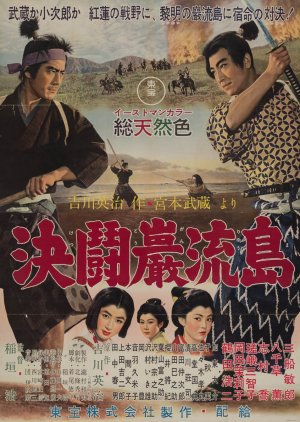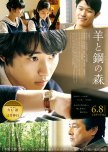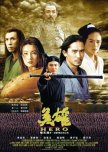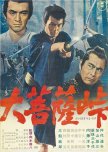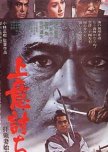
This review may contain spoilers
"A samurai's wife sends off her man with a smile"
Samurai III: Duel at Ganryu Island brings the great samurai's tale to a close in this trilogy. Miyamoto Musashi has gone from hot headed youth to a wiser, accomplished swordsman. He will still have to deal with his rival Sasaki and the two women vying for his love in this film as he seeks out a better life.Musashi has followed the advice of his advisors and only fights when he knows he will have no regrets. He finds other ways to avoid fighting while not losing face such as catching flies (before Mr. Miyagi!) with his chopsticks to warn a room full of rowdy men of his prowess. Swordsman Sasaki finds him and challenges him to a duel. Musashi seems to have no burning desire to do this putting him off for a year. He and his young companion and another man travel to a village that has been devastated by bandits. Here he builds a hut and begins to farm the land. Coming full circle, this time he appreciates the lessons the earth has to teach him. His peace is shattered when not only Otsu, but Akemi show up on his doorstep. He spurns Akemi and she cooperates with the bandits who are planning to burn the village to the ground. In a calmer manner than he did in Seven Samurai, Musashi once again draws his sword and takes care of business. Before meeting with Sasaki for their duel he finally communicates with Otsu and settles their personal affairs. The duel on an island with the sun behind Musashi while he stands in the surf with a large wooden sword raised was stunning.
The paths of the two elite swordsmen were very different. The Shogun's officers courted both Musashi and Sasaki for a high-level position with Musashi turning them down. He was seeking a peaceful life and no longer needed to validate his skills by killing men he had no argument with. Sasaki gloried in his notoriety as a samurai in a high position. And I will not forget he raped Akemi in a previous film where Musashi stopped when Otsu told him no. In the end, Musashi, standing in the waves that would continue to lap against the shore no matter who won or died seemed to realize the futility of their behavior.
As with the other two films, I don't know a kinder way to say that Akemi and Otsu were as emotionally sound as two bags of cats. Musashi had never given Akemi any indication he was interested in her but despite all that had happened to her she still obsessed over him. Otsu wished he just an ordinary man, but would she have still loved him if he had been? She fell in love with his fire and knew his love of the sword from the beginning and yet she stalked him to the ends of Japan to plead her case. Having both of them throwing themselves at him and behaving irrationally took away from my enjoyment of this film and didn't make Musashi seem any more virile. Finally, Musashi actually told Otsu his feelings for her. In all his self-development someone should have clued him in that women do not respond well to silence.
The cinematography was lovely when they used natural settings. In the opening scene, Sasaki and Akemi were standing in front of a beautiful waterfall with cascading rainbows. The final beach scene was colorful and moving watching the two men's silhouettes posturing, looking for the fatal opening. The wigs and clothes were rougher and less pleasing than in the second film. Musashi might be going back to nature, but a comb never hurt anyone. The fights were typical 1950's swordplay. No blood for the most part and it was swing and fall action.
Mifune Toshiro played Musashi as the grown man he was by this film and even in a more subdued mood, his charisma still shone. Tsuruta Koji did a good job with Sasaki and his casual cruelty and arrogance. The actresses did the best they could with the female characters, characters too annoying to be pitiful.
Of the three films, I enjoyed the second one the most followed by this film. There were fewer fights and duels in this film than the last as Musashi was consciously avoiding violence when he could. Duel at Ganryu Island made a proper ending for the trilogy with the unbeatable samurai stepping away from the life he had chased after in his youth with one last moment of graceful brutality. The difference afterwards was that he felt the weight of his actions and the loss of life more profoundly than before.
3/8/23
Was this review helpful to you?

